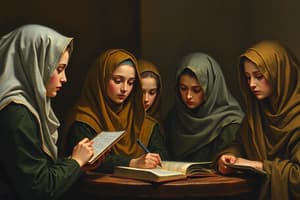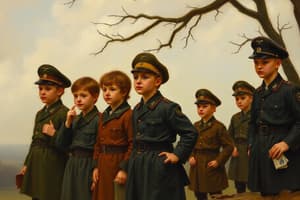Podcast
Questions and Answers
Considering the socio-political milieu described, which of the following best elucidates the mufti's strategic deployment of the term 'blasphemy' in his initial confrontation?
Considering the socio-political milieu described, which of the following best elucidates the mufti's strategic deployment of the term 'blasphemy' in his initial confrontation?
- A sincere theological condemnation rooted in a rigorous interpretation of Islamic jurisprudence concerning female education.
- A performative invocation of religious dogma intended to exert immediate social pressure and circumvent protracted rational discourse. (correct)
- An accurate reflection of mainstream Islamic scholarly consensus regarding the impermissibility of co-educational institutions for adolescent females.
- A nuanced engagement with evolving interpretations of Islamic texts in response to modernization and societal shifts.
Given the Pashtun cultural context and the father's pragmatic compromise regarding separate school gates, what latent implication can be most reasonably inferred about the long-term efficacy of such conciliatory gestures in mitigating entrenched patriarchal resistance to female education?
Given the Pashtun cultural context and the father's pragmatic compromise regarding separate school gates, what latent implication can be most reasonably inferred about the long-term efficacy of such conciliatory gestures in mitigating entrenched patriarchal resistance to female education?
- The father's strategic capitulation demonstrates a masterful understanding of Pashtun social dynamics, ensuring the complete and irreversible neutralization of patriarchal opposition.
- Such compromises invariably foster enduring goodwill and erode deeply ingrained patriarchal norms through gradual societal evolution.
- Pashtun 'nang' (honour) culture ensures that compromises, once reached, are perpetually honored, thereby guaranteeing the sustained progress of female education.
- Conciliatory measures, while offering temporary respite, may inadvertently reinforce the underlying patriarchal structures by conceding ground on principles of gender parity. (correct)
Analyzing the mufti's claim to represent 'good Muslims,' and considering the clandestine attendance of his niece at the school, which critical socio-psychological phenomenon is most acutely exemplified?
Analyzing the mufti's claim to represent 'good Muslims,' and considering the clandestine attendance of his niece at the school, which critical socio-psychological phenomenon is most acutely exemplified?
- The inherent hypocrisy endemic to all forms of religious authority and pronouncements.
- A genuine schism within the Islamic community regarding the permissibility of female education, reflecting legitimate theological diversity.
- Cognitive dissonance arising from adherence to public dogma while privately subverting it for personal benefit or familial exceptions. (correct)
- Confirmation bias within religious communities leading to monolithic interpretations of faith.
In the context of the narrative, the elder's questioning of the father's piety ('I'd heard you were not a pious man') juxtaposed with the observation of Qurans in the home serves primarily to:
In the context of the narrative, the elder's questioning of the father's piety ('I'd heard you were not a pious man') juxtaposed with the observation of Qurans in the home serves primarily to:
Considering the narrator's description of the madrasa as 'an open-air mosque where boys and girls studied the Holy Quran together' and her positive experience there, how does this contrast with the mufti's pronouncements on female education and 'purdah'?
Considering the narrator's description of the madrasa as 'an open-air mosque where boys and girls studied the Holy Quran together' and her positive experience there, how does this contrast with the mufti's pronouncements on female education and 'purdah'?
The narrator's statement, 'Generally, when a Pashtun man loses an argument, he never really forgets. Or forgives,' in the context of the mufti's apparent retreat, functions as a:
The narrator's statement, 'Generally, when a Pashtun man loses an argument, he never really forgets. Or forgives,' in the context of the mufti's apparent retreat, functions as a:
Considering the mention of the maulana's 'illegal radio broadcast' and its influence on the mufti, what primary function does this detail serve in understanding the broader context of the threat to the school?
Considering the mention of the maulana's 'illegal radio broadcast' and its influence on the mufti, what primary function does this detail serve in understanding the broader context of the threat to the school?
The father's compromise of separate gates for older girls can be interpreted through multiple lenses. Which of the following perspectives offers the most nuanced understanding of its significance beyond a mere practical solution?
The father's compromise of separate gates for older girls can be interpreted through multiple lenses. Which of the following perspectives offers the most nuanced understanding of its significance beyond a mere practical solution?
The narrator's childhood engagement with both secular schooling (Khushal School) and religious education (madrasa) presents a dichotomy. However, in the context of the unfolding threat, what deeper synthesis or conflict does this dual educational background reveal about her position?
The narrator's childhood engagement with both secular schooling (Khushal School) and religious education (madrasa) presents a dichotomy. However, in the context of the unfolding threat, what deeper synthesis or conflict does this dual educational background reveal about her position?
If the narrative were to continue, and considering the narrator's concluding intuition about unforgiving Pashtun men, which of the following subsequent developments would be the MOST probable escalation of the threat against the school?
If the narrative were to continue, and considering the narrator's concluding intuition about unforgiving Pashtun men, which of the following subsequent developments would be the MOST probable escalation of the threat against the school?
Flashcards
Mufti
Mufti
An Islamic scholar who interprets and applies Islamic law.
Purdah
Purdah
A practice of female seclusion in some Muslim communities.
Blasphemy
Blasphemy
The act of showing disrespect toward sacred entities or beliefs.
Elders
Elders
Signup and view all the flashcards
Madrasa
Madrasa
Signup and view all the flashcards
Quran
Quran
Signup and view all the flashcards
Pashtun
Pashtun
Signup and view all the flashcards
Holy Quran Studies
Holy Quran Studies
Signup and view all the flashcards
Compromise
Compromise
Signup and view all the flashcards
Illegal radio broadcast
Illegal radio broadcast
Signup and view all the flashcards
Study Notes
First Direct Threat
- A mufti, an Islamic scholar, confronted the narrator's family.
- The mufti criticized the narrator's school, saying it was inappropriate for girls to attend.
- The mufti claimed the school was blasphemous and girls should be in purdah (Islamic dress code).
- The mufti was influenced by a maulana who was giving sermons against "un-Islamic" practices.
- The mufti's niece secretly attended the school.
- The narrator's father made a compromise for the girls to enter a different gate.
- The mufti eventually backed down.
- The narrator witnessed stubborn Pashtun men in disputes.
- The narrator studied the Quran since childhood.
- The narrator's family sent her to the madrasa for religious studies after school.
- The madrasa was an open-air mosque with boys and girls studying the Quran together.
- The narrator loved learning the Arabic alphabet and reading Quranic stories.
- The narrator's madrasa teacher was wise and kind.
- The Khushal School was where the narrator did other studies.
Studying That Suits You
Use AI to generate personalized quizzes and flashcards to suit your learning preferences.




